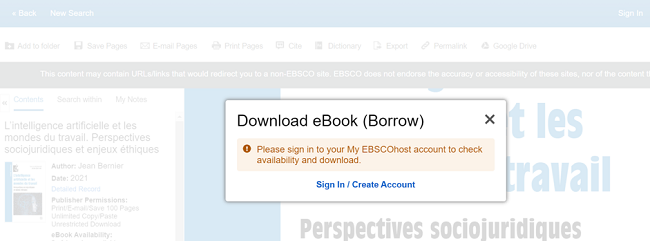How do I... - Friday 20 January 2023
Right of diffusion of the K-lab documents

Can I copy a document to distribute it (documents from K-lab, Moodle or the Internet)? How do I know if I am respecting copyright?
Copyright can be seen as a "necessary evil" to encourage creation, before it can be appropriated by the public (F. Benhmaou, J. Farchy, Droit d’auteur et copyright, La découverte, 2007, p.112). It is also, in the broader context of intellectual property, an important economic issue. For example, copyright is particularly invoked by countries that are globally more exporters of content, but also by a few multinationals that concentrate the ownership of intellectual property rights on cultural content.
In this context, digital technology now makes copying much easier and more widespread, and therefore increases the risks of counterfeiting, in other words, of unauthorized copying. To summarize: "a new balance has to be found between the claims of those who want to take advantage of the potentialities of the Internet to widen their access to culture and the legitimate aspirations of authors and their rights holders to a "fair" remuneration” (Ibidem, p.56).
See below how the rules in force for the dissemination of K-lab and Internet documents are applied in respect of copyright.
May I, for example, distribute:
- in their entirety: a book? Course slides? A pedagogical case (ESSEC, Harvard...etc) A press article? An academic article (Open Access or not)? A market study?
Only if I have acquired the license for each copy.
A paper or electronic book available in two copies at the K-lab can only be used by two people at a time. It is forbidden to download or scan the entire paper book and put it online on the course website or send it by email to all students or participants.
Some publishers make it technically possible to download a chapter or the entire book. However, this does not give you the legal right to redistribute it.
A case study should be acquired in as many copies as there are students taking the course.
Or if it is an Open Access document. Their free license encourages dissemination on the contrary. But this should always be done with a reference to the source
Instead of distributing the document itself, I can distribute a hyperlink to the document. Anyone with access rights to the K-lab online resources will then be able to view it. This includes all students in diploma training, professors and administrative staff of the school.
As a reminder, it is forbidden to redistribute all course materials, including the pedagogical cases of course; a fortiori on external sites such as coursehero.
For exemple, this Springer book is available "unlimited" on the model of journal articles:

The PDF is downloadable for individual use, but may not be shared with others.
Similarly, this Ebsco ebook, available in a limited number of copies, should not be redistributed.

- a substantial portion of these materials?
Cursus that grant diplomas (not executive) benefit from an educational exception (read the Legal Framework of Educational Documents for more information). This means that they can broadcast an excerpt equivalent to 10% of a book (about one chapter) or 30% of a magazine issue (about one article), and 6 minutes of a film. This broadcasting can only take place within a very specific framework, that of a course in a degree program given by a non-profit organization, taught by a professor to his students. Course books, scores, music, videos and pictorial works are not concerned by the educational exception...
This educational exception is conditioned to the payment of a compensation by the training organization or its public supervisory body to the Centre Français du Droit de Copie, which then pays this compensation to the publishers.
For all other documents, it is necessary to be able to ask the author or their beneficiaries for permission to use a substantial part of his work.
Once again, Open Access documents, under a Free License, Creative Commons for example, can also be redistributed in the form of extracts, as long as the source is cited.
Applying these rules for sharing documents will allow our readers to:
- avoid infringing copyright and legal provisions that bind us to our content providers;
- know the rules that allow them to act in a broader context, respecting these rights;
- to protect their rights as a content producer, if any;
- to be aware of the economic value of the information;
- be aware of the socio-cultural value of the document in relation to the status of the author and more broadly the status of the content producer.



